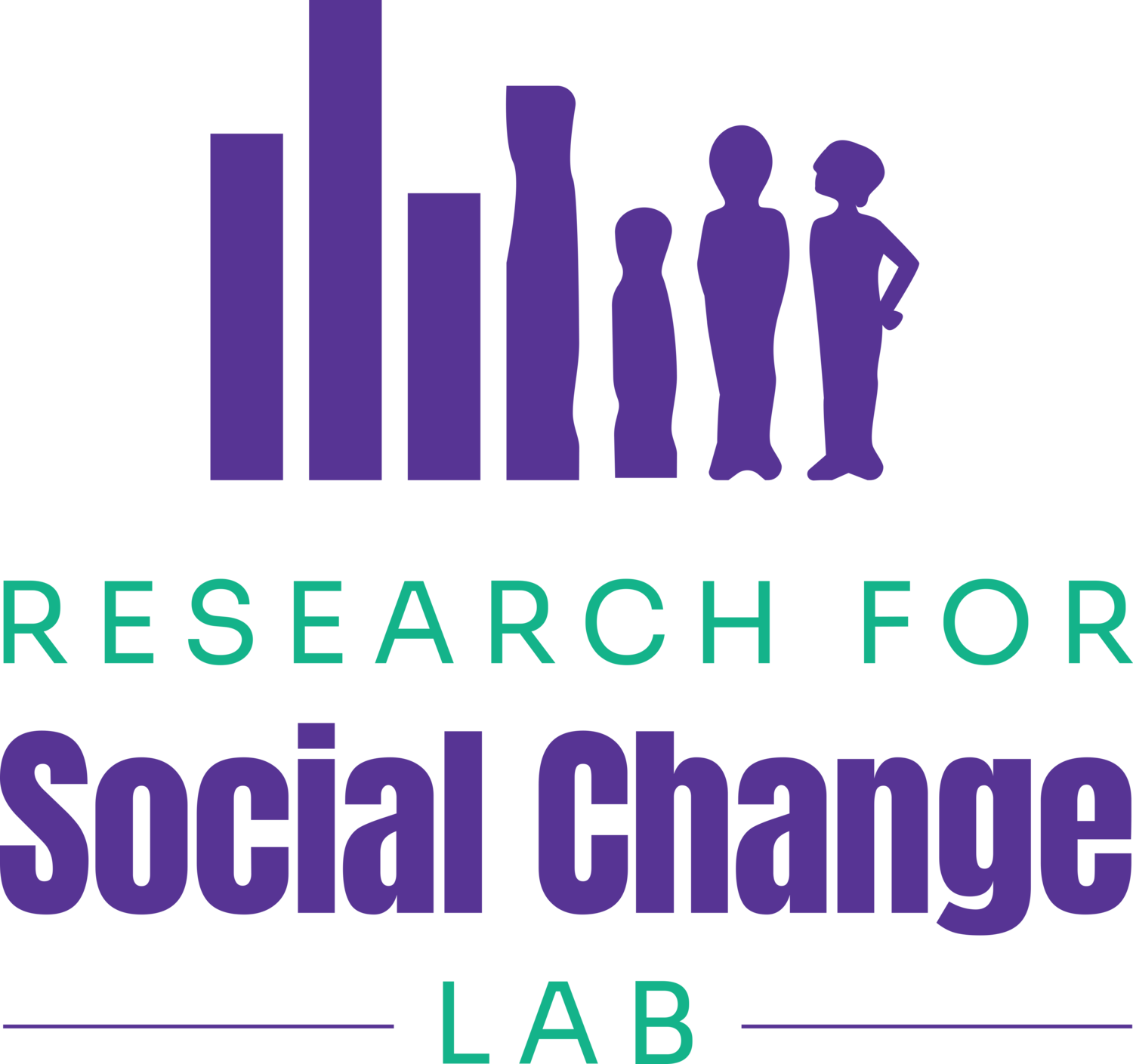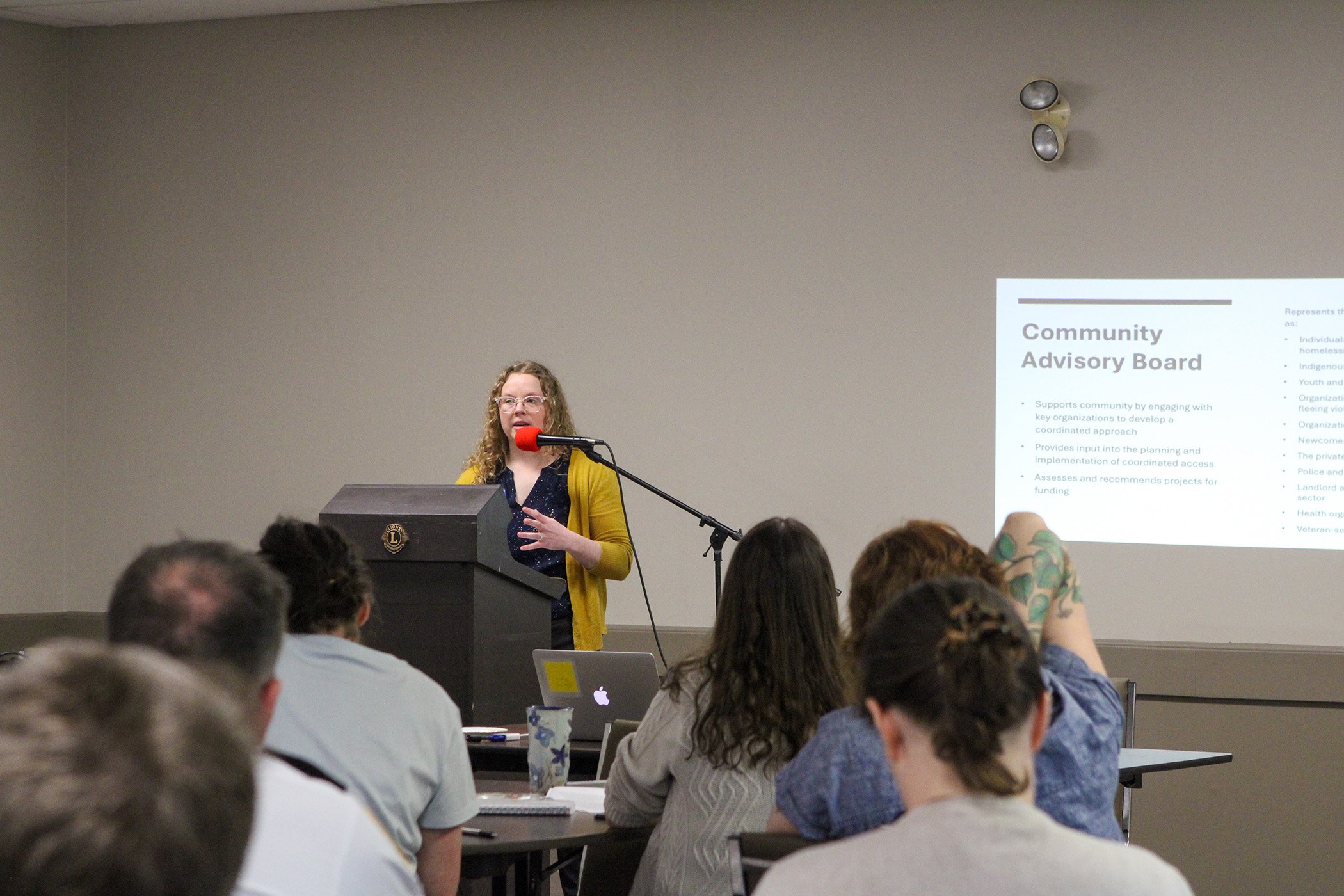Community brainstorms solutions to homelessness at RSCL and PDS research forum
By Anika Rosen, Undergraduate Research Assistant
On May 9th, the Research for Social Change Lab, the Peterborough Drug Strategy, and the Peterborough and District United Way hosted a community forum on housing and homelessness in Peterborough. Held in East City, the forum consisted of presentations from local researchers, interspersed with chances for community collaboration and connection.
The Building From Experience team from the Research for Social Change Lab kicked off the presentations, sharing findings from their ongoing human rights-based investigation of the homelessness responses in Peterborough. A major aspect of their research has focused on how and if Coordinated Access has been working in our community to help people experiencing homelessness access housing. Coordinated Access is a federally mandated effort to increase efficiency, fairly distribute resources, and provide support to the homeless population.
There are four steps to Coordinated Access. First, a person must access the system. Then, an assessment is done to measure the person’s level of need. Third, assessment scores are prioritized from highest to lowest based on need. Finally, the matching and referral stage allows for clients to be matched with the supports they qualify for based on their priority -- with high priority clients receiving more intensive support. Throughout their investigation, the Building from Experience team found issues at each stage.
The four steps of Coordianted Access.
Interviews revealed that both system users and system service providers felt community access points were not particularly accessible. Not only is the process confusing for those trying to access the system, but it takes a toll on frontline workers with limited employment protections and low wages. The second pillar requires a standardized assessment tool to measure the needs of clients in an objective way. The interviews suggest that the assessment tool being used does not capture a complete picture of clients’ needs, producing unreliable results that undermine the ability to provide adequate support. Additionally, people reported the questionnaire can be retraumatizing due to the sensitive nature of the topics. Third, the prioritization process is not seen as responsive to the needs of clients that service providers are seeing, and Indigenous people are not considered a priority group in Peterborough. As a city between three First Nation reserves, outcry from the audience reflected how we should be taking strides to support the Indigenous communities around us. As one audience member put it, Peterborough “spits in the face of truth and reconciliation” by not recognizing this pattern and prioritizing Indigenous people. The final pillar of Coordinated Access, matching and referral, involves matching clients to housing that suits their needs using their assessment scores. Interviews suggest that there is not enough housing available to match people’s needs and very little flexibility in the matching process.
Left to right: Thamer Linklater, Sam Blondeau, and Mary Anne Martin, all from the Research for Social Change Lab, share results
from the Lab’s study on Peterborough’s homelessness system.
The Research for Social Change Lab has been sharing their findings through zines, and released three new zines at the event: “Incarceration,” “Shelters,” and “Possessions.” The topic of the latter zine sparked the audience’s attention during a discussion period when one person said reports of people's lives being thrown in the dumpster were heartbreaking. This audience member condemned the complaint-driven process of bylaw enforcement which allows for people to be pushed out of public space by threatening and destroying sentimental possessions. Another person in the room added that this approach does not only harm those who lose their things, but it hurts those who have to throw things out. When someone reported workers crying as they put tents in the garbage, the experience stood out to me, and made me think about how I would feel in that situation. Imagine never being confident you can safely store your things. Imagine being the person who has to throw out other people’s loved possessions for a paycheck, and having to pick between an income to survive and your moral compass.
The Research for Social Change Lab released three new zines at the event. The zines focused on people’s experiences
of incarceration, possessions, and homeless shelters.
Another major finding from the interviews about Peterborough’s response to homelessness was that the bylaw that penalizes tenting was condemned by almost half the participants. Interviews revealed that people were choosing to sleep outside because they wanted autonomy—which is limited in shelters—and tenting provided community, agency, and choice. More reasons were given for avoiding shelters, including long waits for access, gender-based violence, too much drug use, too much drug policing, and being turned away because shelters are full. With the bylaw, these threats are more prevalent as both going to shelters and avoiding them proves risky. Beyond the harm that can be done in shelters, with tenting criminalized, there is a larger risk that trying to retrieve agency will result in tickets a person cannot afford to pay and the loss of their possessions.
Another presentation came from Lily Dart from the Peterborough Drug Strategy. She clarified the different roles each level of government has in responding to homelessness. In the broadest sense, the federal government outlines the approaches that should be taken; the provincial government has funding available; and it is the municipal governments’ task to distribute funding and follow the federal guidelines to create community specific approaches to homelessness. By breaking down the information, Lily showed how the lowest level of government, municipal, has the least amount of flexibility yet the most responsibility in their responses to homelessness due to constraints from other levels of government.
Lily Dart from the Peterborough Drug Strategy shares her research on responses to homelessness in
other mid-sized cities in Ontario.
In the second half of her presentation, Lily talked about innovative homelessness response strategies in several of Ontario’s mid-sized cities to create a starting point for Peterborough to develop its own response. Some strategies Lily identified included the City of Kingston, which has centered harm reduction in their work and created a wrap-around care center that can be accessed at any time. Waterloo and the surrounding area improved the quality of their data on homelessness by listening to people working on the ground. Waterloo also developed short term and long term solutions simultaneously, by taking immediate action and setting the groundwork for future systems. In Sudbury, sharing data on homelessness and making it available to the public allowed for increased understanding and informed choices in the community. During the discussion period many of these strategies were brought up as solutions for Peterborough, showing how we could learn from these innovative approaches; there were many calls for accurate and transparent data to challenge misinformation in our city.
Betsy Farrar from Peterborough & District United Way presents on the United Way’s role as the Community Entity
for Reaching Home in Peterborough.
In fact, all of the presentations at this event actively sought to make the homelessness system in Peterborough more understandable for community members. Many presenters sought to clarify the processes that make up our complicated systems. For instance, Betsy Farrar from the United Way presented on how working together as a community allows for progress. Betsy outlined how the national strategy for approaching homelessness in our country is called Reaching Home and it helps fund local initiatives. To dictate which local initiatives can get funded, communities have an advisory board; a group who represents the community that is being served to help reach its goals. For me, this clarity helped me better understand the importance of smaller group initiatives. This highlighted the role individuals and collectives play in the big picture.
Once presentations were over, the audience engaged in an exercise where they worked as groups to brainstorm possible solutions to obstacles that had been brought up during the forum. These ideas were shared in the final ten minutes and the Research for Social Change Lab and Peterborough Drug Strategy intend to synthesize these ideas and share them with the community in a solutions-focused forum this fall.











